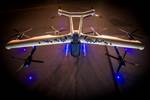Airbus puts a pause on CityAirbus NextGen eVTOL program
Airbus Helicopters is hitting the breaks on program progress, citing that battery technologies need to evolve before it can launch a successful UAM program.
Source | Airbus Helicopter
In a debriefing of the company’s 2024 conventional helicopter sales, says industry sources, Airbus Helicopters (Marignane, France) CEO Bruno Even announced plans to put a hold on development of its CityAirbus NextGen electric vertical takeoff and landing (eVTOL) aircraft, citing that “the conditions to launch a new program are not necessarily there.”
Airbus unveiled the CityAirbus NextGen program in 2021. Building on the expertise of partners in various urban and remote environments (ITA Airways and Hiratagakuen), as well as composites experts (Spirit and KLK Motorsport and Modell- und), the company began its operations with a power-on in December 2023 and flight test campaigns beginning November 2024 at the test center in Donauwörth, Germany, which was built and officially opened in March 2024. Airbus’ original objective was to launch a full program before the end of the end of the decade.
“[The launch four years ago] has been clearly instrumental in advancing our understanding of technologies which are not only relevant for the urban air mobility market but for all our portfolio,” Even says. However, available battery technology are believed to be a barrier to progress with current eVTOL plans. The launch of any UAM program depends on factors including regulation, maturity of the business model and maturity of the technology.
“The condition to launch a new program, from the technology side … is [first] to be able to perform the mission,” Even adds, as . “We clearly see on the battery side the need to continue to improve the performance to reach what we consider the minimum level of performance and mission.”
This is not to say that Airbus Helicopters has given up on the CityAirbus NextGen entirely. According to , for now the company plans to complete its demonstrator’s planned flight test campaign, which is expected to last about a year, while continuing to “monitor the situation.”
Related Content
-
Plant tour: Collins Aerospace, Riverside, Calif., U.S. and Almere, Netherlands
Composite Tier 1’s long history, acquisition of stamped parts pioneer Dutch Thermoplastic Components, advances roadmap for growth in thermoplastic composite parts.
-
Combining multifunctional thermoplastic composites, additive manufacturing for next-gen airframe structures
The DOMMINIO project combines AFP with 3D printed gyroid cores, embedded SHM sensors and smart materials for induction-driven disassembly of parts at end of life.
-
Low-cost, efficient CFRP anisogrid lattice structures
CIRA uses patented parallel winding, dry fiber, silicone tooling and resin infusion to cut labor for lightweight, heavily loaded space applications.






